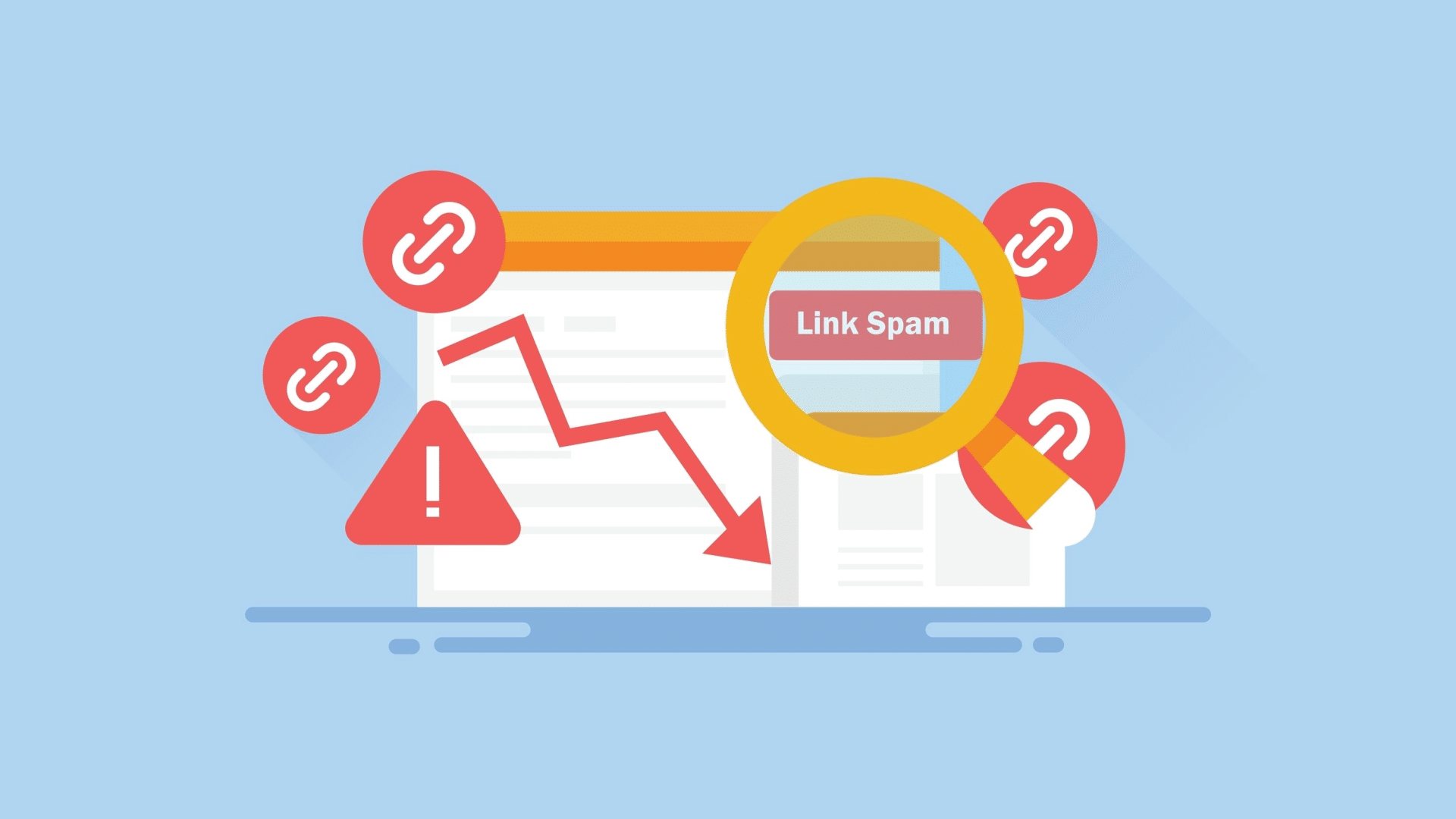After all the huffing and puffing, Google’s SGE-turned-AI Overviews rolled out across 84% of searches – only to be rolled back to 15%.
Temporarily. Most likely. For now. Equally likely to roll out someday soon.
Let’s all take a collective pause and take a deep breath. It’s all gonna be OK.
For all SEO has changed over the past two decades, it actually hasn’t changed all that much.
Here’s why and how to forge ahead in the meantime.
Search cannibalization has already been happening for years – AI Overviews just continue that trend
On the one hand, AI Overviews will create new “losers,” cannibalizing search traffic for certain sites and specific query types.
But on the other, this is nothing new.
I’d argue it’s more of an evolution of what’s already been happening under the surface for many, many years.
You see, savvy SEOs have been picking up the “zero-click SERP” phenomenon since at least 2018.
That only accelerated through 2019, into 2022 and today.
Where AI Overviews are poised to continue displaying automated listings, instant answers and new SERP layouts – all at the expense of the traditional “free” organic 10 blue links.
But all of this predates even 2018.
Google’s Knowledge Graph already “answered roughly one-third of the 100-billion monthly searches” dating back to mid-2016. And that number ballooned to 500 billion facts by 2020.
Google any black-and-white, concrete query like “European date format” and a searcher sees the actual answer (scraped from the underlying content) within seconds.
There are literally countless examples of this trend.
When it’s time to get your drink on after a long Friday of trying to explain AI Overviews to upper management and you’re met with a Manhattan cocktail recipe – instead of needing to click on the publisher who actually helped populate each answer.
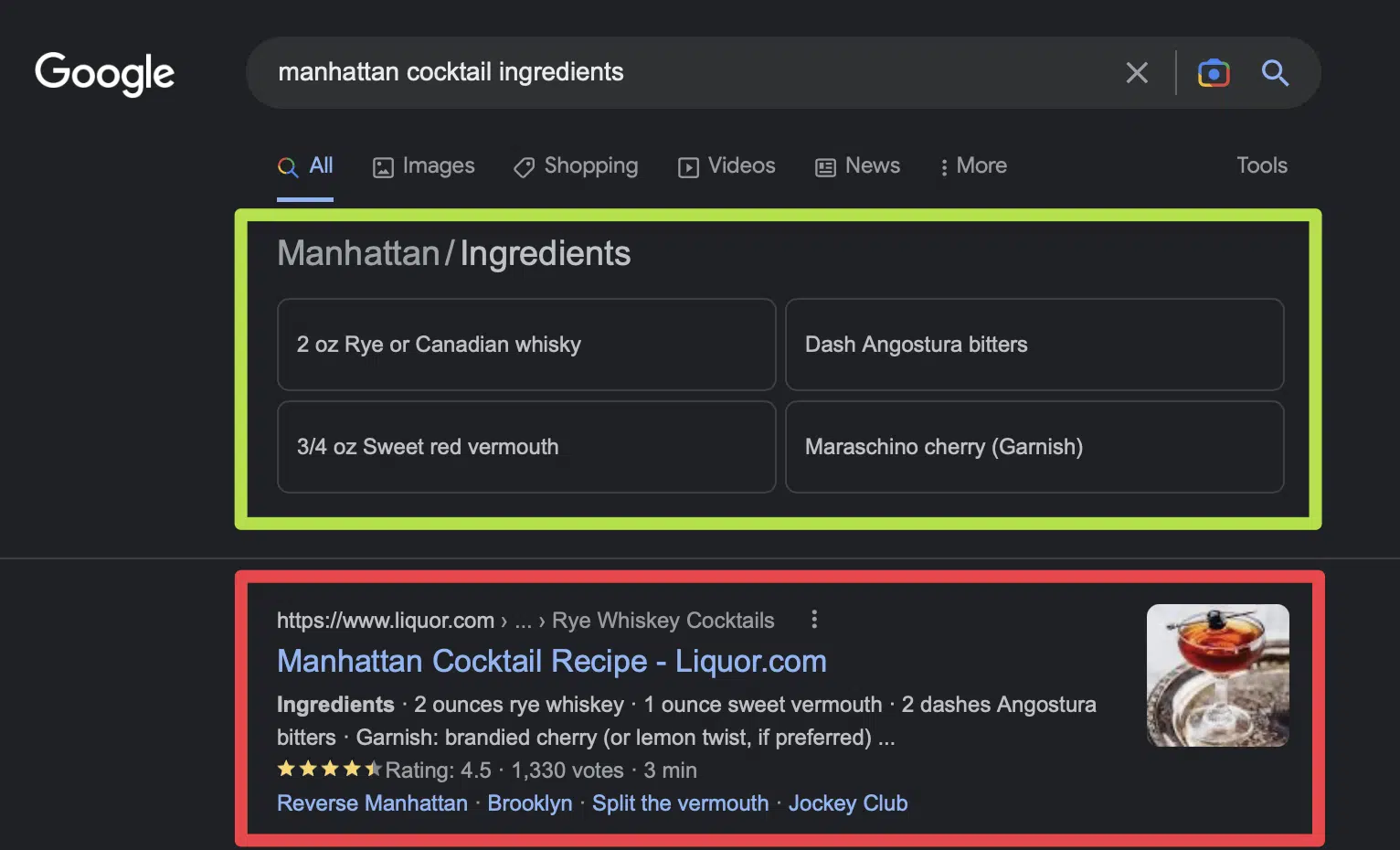
The point is that AI Overviews simply accelerate a preexisting trend.
Sure, new developments will continue long into the future, continuing to force SEOs to evolve on a daily basis (or seemingly hourly at this point).
But, the silver lining is that there is still plenty of “blue ocean” to explore.
While SEO has changed greatly over the past few decades, the underlying fundamentals have remained relatively unchanged.
That’s the only benefit of being old in the SEO space.
Do you remember when “SEO died” the first few times because of Panda, Penguin and a slew of other stupidly named, animal-based algorithm updates that sent shivers down marketers’ collective spines?
(And how come they gotta name all these after the cutest animals in the zoo?)
C’mon, were any of you really surprised over the last few weeks?
The stuff SEOs have been theorizing for years, like authorship to domain ratings and more – despite “what Google says” – is actually kinda, sorta legit.
SEOs (and digital marketers in general) should create good content for their audience first and not overrely on a single channel.
Oh, and the fact that links still actually matter.
Shock! Surprise!
So, if you were actually doing good SEO to begin with – not just publishing AI crap in the last 12 months and expecting instant results – it’s largely business as usual.
Otherwise, here’s where you start.
Tip 1: Prioritize keywords and topics based on potential ROI over the next 6, 12 and 18+ months
Everyone has access to keyword data. That’s not the issue.
The problem in SEO since Day 1 has always been what you DO with said data.
How you interpret it, how you analyze it and how you make decisions based on it.
This is only more true in a world of AI Overviews continuing to cannibalize top-of-funnel queries.
And it’s why generic data-vomiting keyword research strategies have always been doomed to fail from the start.
Especially now.
For instance, take a look at “international SEO.”
It is a big, juicy keyword that gets nerdy marketers’ hearts aflutter.
And yet? For basically everyone out there reading this – potentially as many as 99.99% of you – a complete waste of time.
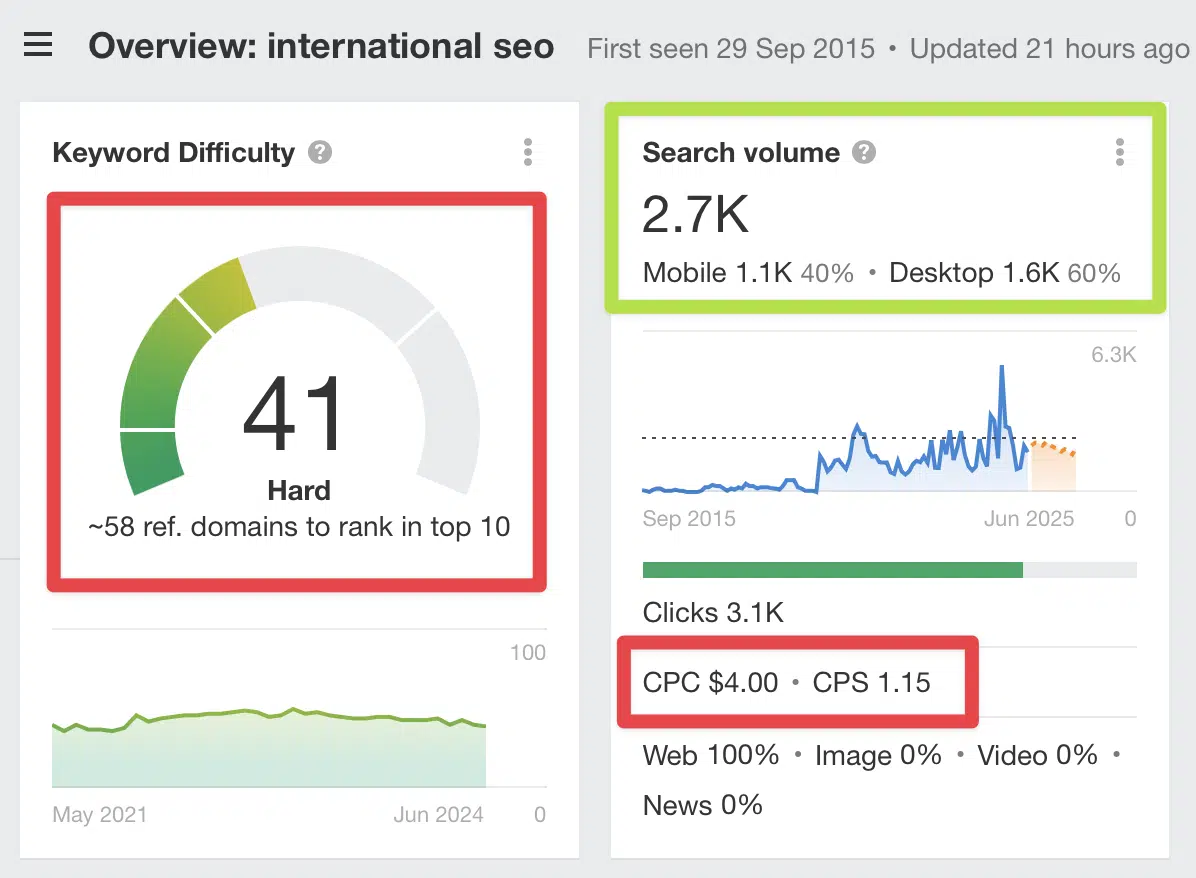
You already know it’s a “difficult” keyword. What most miss is that “Keyword Difficulty” is biased in most, if not all, tools. It essentially refers to the number of external links to each page currently ranking in the top spots.
So, “page-level” competitiveness, in other words, is vs. actually taking into account the overall strength of the brands currently ranking.
Take a quick look at the brands ranking:

This is in addition to the disappointingly low purchase intent (see the advertising-based CPC estimate as a half-decent proxy).
The point?
The vast majority of you have no business even creating a single piece of content around this in the first place – unless…
- You’re publishing on a DR ~90+ site to begin with.
- You have years to wait.
- Or you super patient bosses. (Do they even exist?)
None of this has anything to do with what Google is doing with AI Overviews on this query yet, either.
Get the daily newsletter search marketers rely on.
Tip 2: Always start with high customer intent + product relevance, then expand out
Now, check out this admittedly very difficult query for “best voip phone systems for small business”:
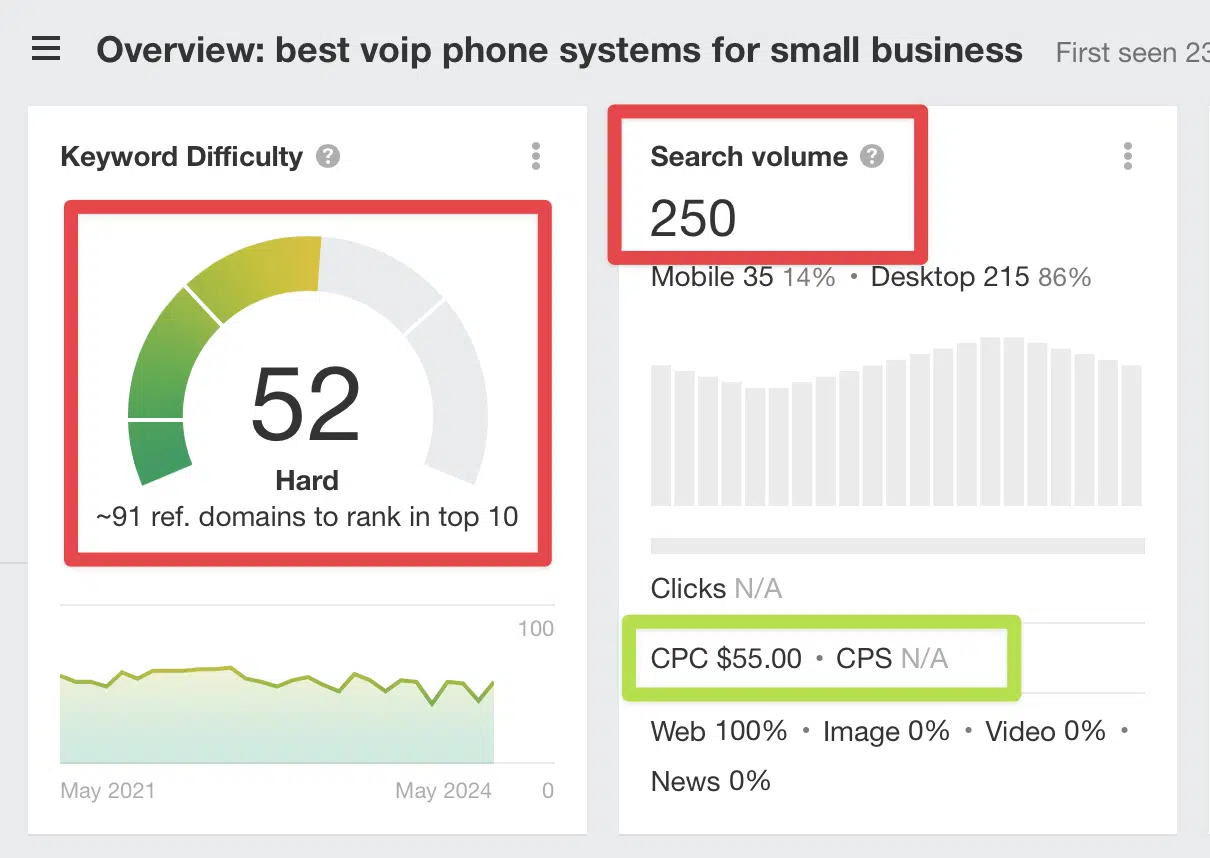
Tough, no doubt. Low-ish volume, too.
However, if it’s highly relevant from a business perspective, it can also be incredibly lucrative due to the high intent.
If you’re on a small-ish site or a shoestring budget, you’ll probably need to Beachhead Principle your way to the top over a series of months (if not 12+).
However, the point is that this is actually worth the fight.
This is especially true with B2B SEO and its effect on CPLs, where high purchasing intent is often better than raw volume.
So, if next year’s SEO results rely on your work this year, then you don’t have any real time to waste stressing about things you can control.
Or publishing on topics you have no business in targeting in the first place.
So instead, keep doubling down on the things that won’t change anytime in the near future, like:
Tip 3: Focus your time, energy and budget on content + queries that are least likely to be disrupted anytime soon
AI has two implications in the content and SEO world in the foreseeable future:
- AI Overviews will continue to provide instant answers to black-and-white queries that are already ready to answer.
- AI in content creation can also similarly create passable-if-uninspiring black-and-white content for similarly concrete queries.
Where AI Overviews and AI content creation, in general, still largely suck is subjectivity.
It can’t handle any nuance, persuasion, credibility or gray area.
That’s why it can tell you what “advanced Excel formulas” are in theory, but it:
- Can’t show you any advanced Excel formulas.
- Can’t explain why they matter or how they help you.
- Can’t display some of the most common advanced Excel formulas for the right type of reader or audience member based on profession.
- Can’t put them into a usable format like a free template or tool that does the calculations for you.
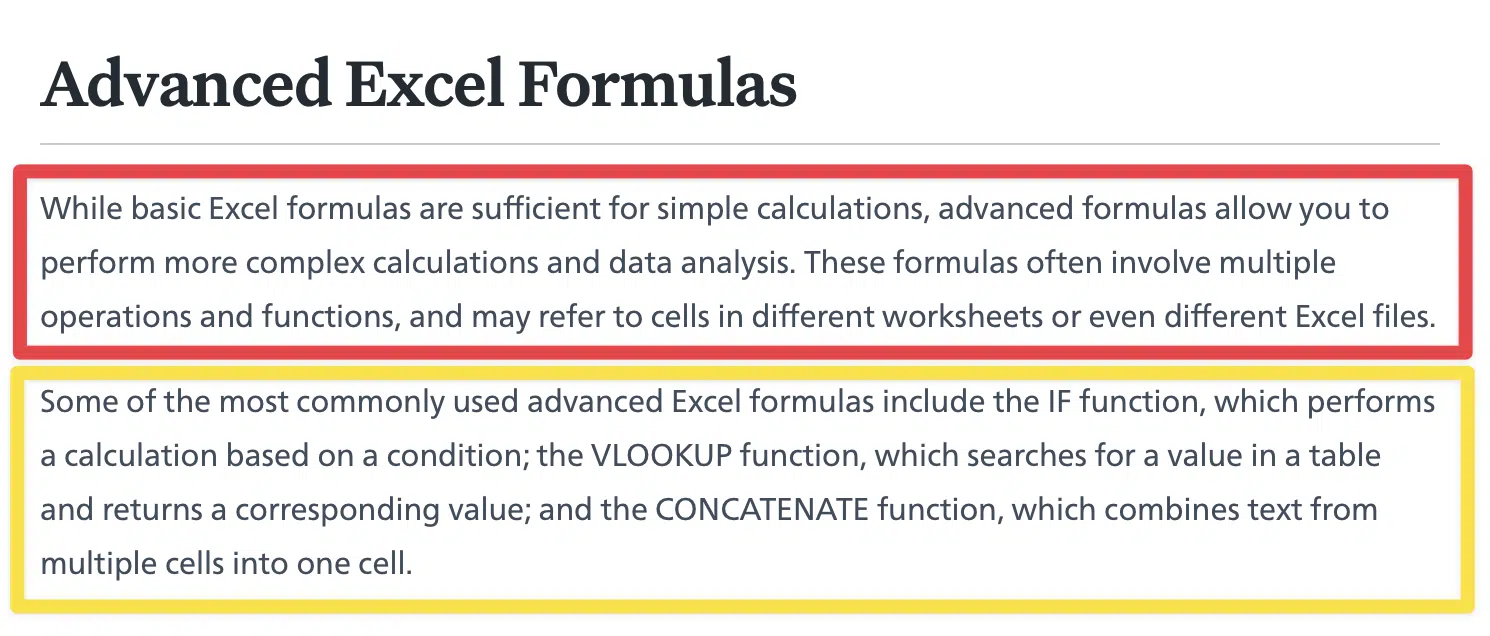
Said another way:
AI Overviews and AI content will always struggle mightily to handle the middle and bottom-of-the-funnel terms. Or the same ones that actually drive leads and sales.
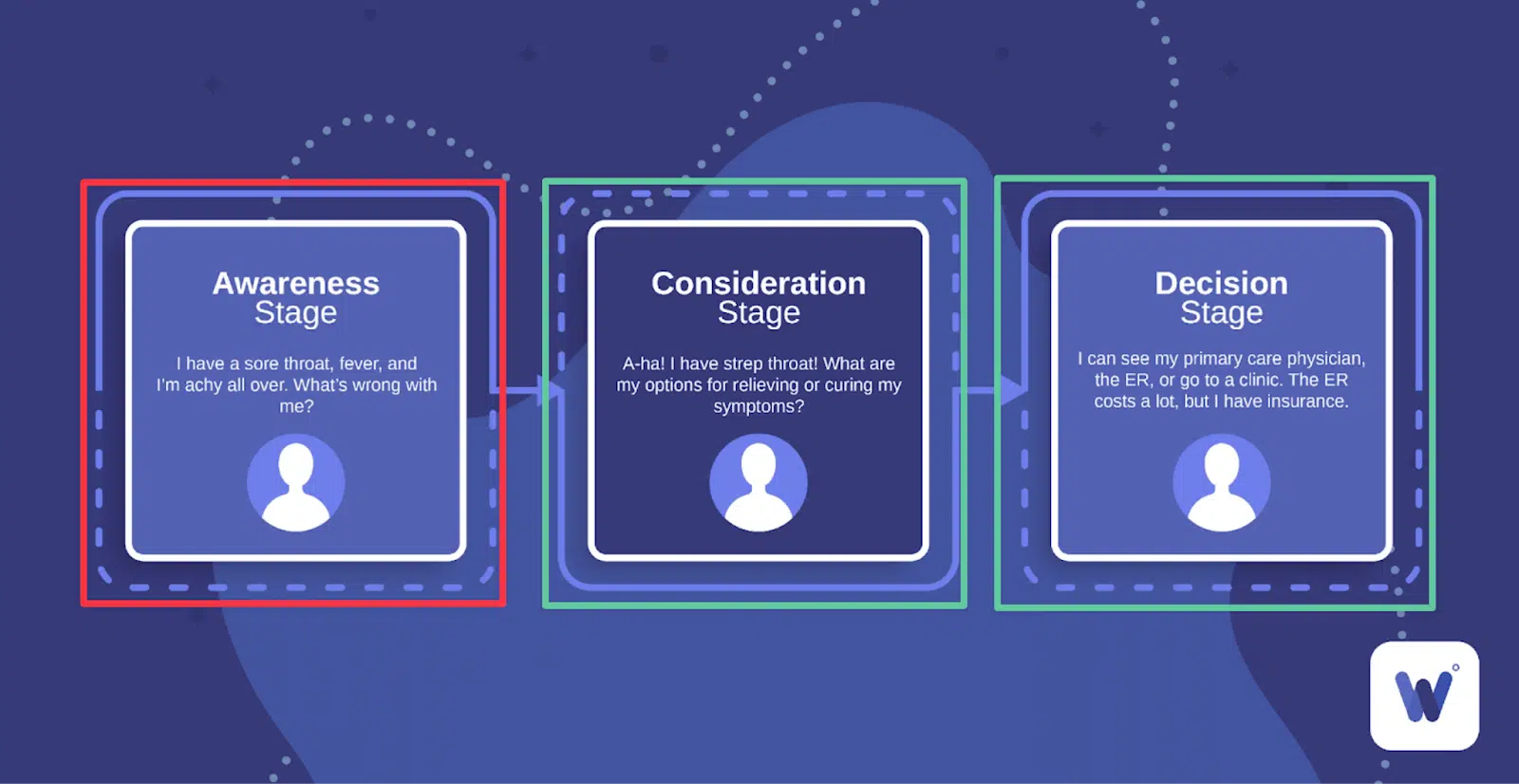
Here’s a final example to help drive this point home further.
Quick:
- What is the “best dive watch”?
Let’s Google it!
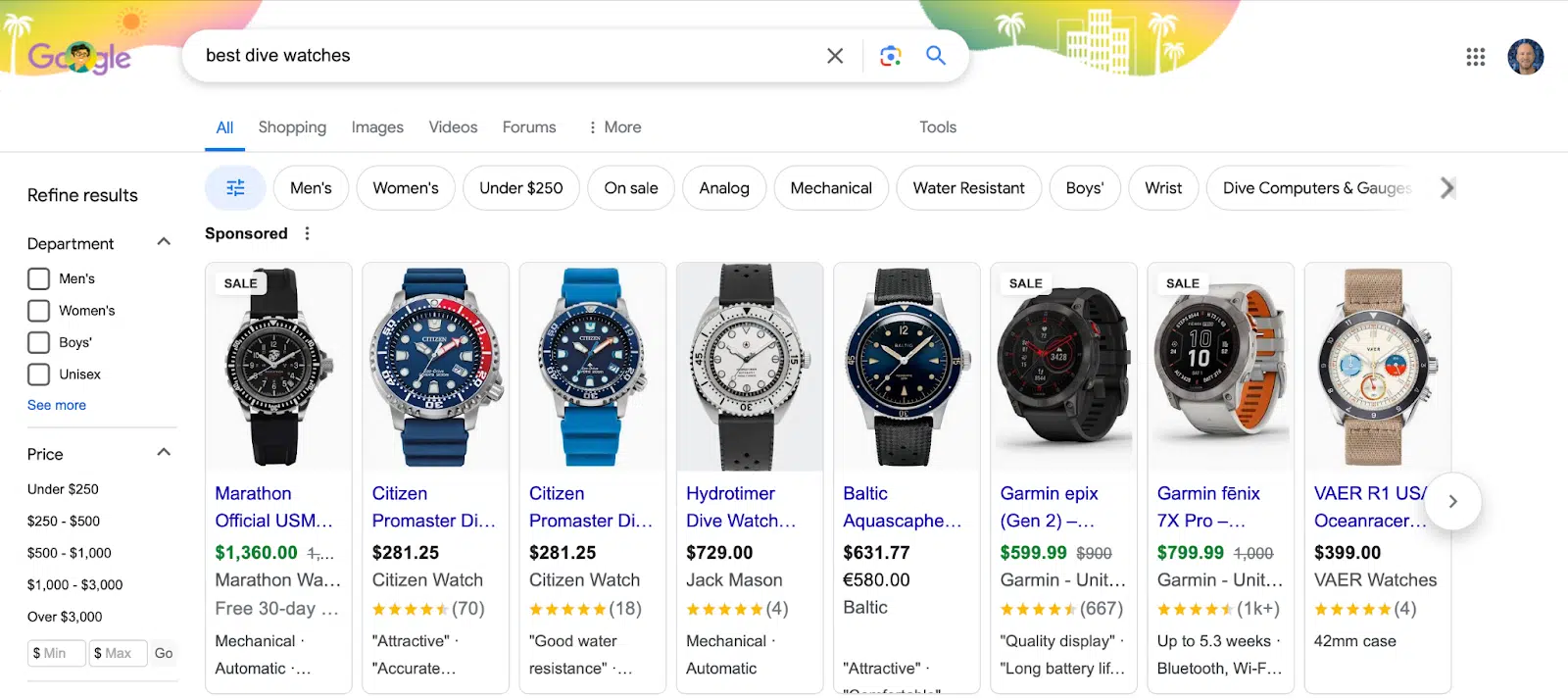
The top shopping listings include:
- A couple of indie automatic watch brands in the ~$700-1400+ range.
- A couple of quartz movements (boooooo!) in the ~$200-600 range,
- A couple of smart watches, which, while great for working out, definitely aren’t “dive watches” at all.
What’s missing for the watch nerds out there?
Any actual real dive watches!
No Seikos, no Tudor, no Omegas, no Rolexes.
Shoot, not even a budget-friendly G-Shock in sight for the hipsters.
In other words, any “smart” watch consumer (read: the kind more willing to spend more on more watches) would know that these are all largely terrible results to that question.
Go watch a couple of YouTube videos on “best dive watches” and then cross-reference with this list.
None of these brands or watches would actually make the cut in any real enthusiast’s list of the “best dive watches.”
Now. Why are these results so terrible?
’Cause this is actually a nuanced topic!
Head over to Ahrefs and you’ll see that there are over 860 (!) potential clusters for “dive watches.”
Translation: Lots of gray area and nuance.
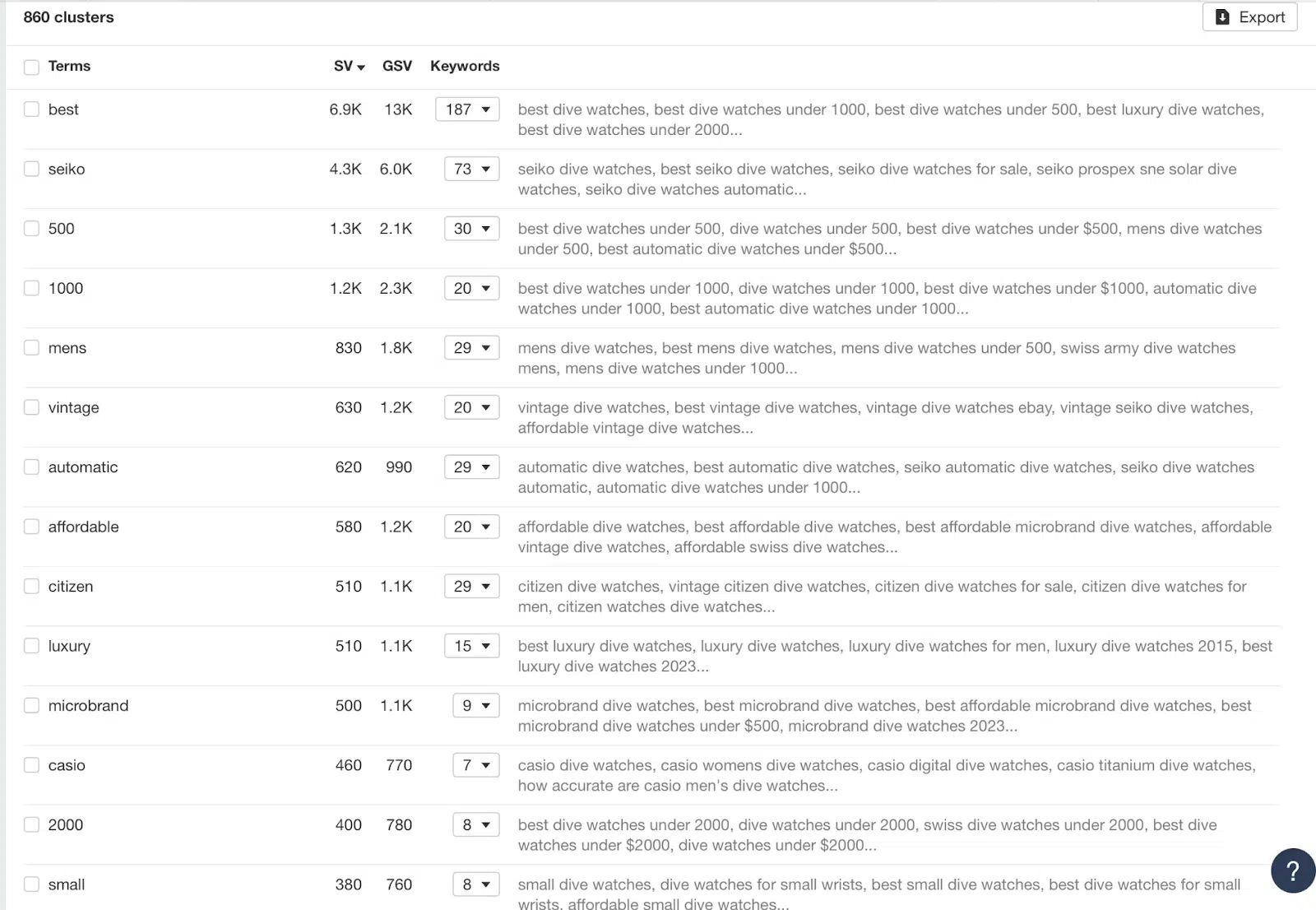
There’s tons of volume in the “affordable” and “$500-1,000” arena.
So, combined with the last two tips: would Rolex target these keywords, for instance, even if they could win top SERP spots?
Nope.
‘Cause they’d be flooded with a bunch of traffic with only $1,000 to drop on a watch vs. the ~$10,000+ it would actually take to get your hands on one.
Instead, Tudor or Omega or Rolex would spend more time on the “luxury” cluster, whereas a second-hand market or broker might laser-focus on the “vintage” one.
Beyond the hype: Adapting your SEO strategies for Google’s AI Overviews
The writing is undoubtedly on the wall.
AI Overviews will evolve the SERP landscape and continue to erode the most easily answerable queries online.
But none of this is new. Or that surprising frankly.
Because it’s simply the continued acceleration of pre-existing trends that have already been occurring since at least 2016.
So yes, AI Overviews will continue to erode TOFU topics. But, that’s not where the real money is, anyway.
Instead, double down on prioritizing the right keywords at the right time, focusing on queries that bring buyers and not eyeballs, re-creating the typical buyer’s journey for how people shop for your stuff anyway.
Then, just focus on beating what’s in front of you.
It may not be the sexiest strategy. But it’s predictably profitable.
And that’s ultimately why we should all be in this in the first place.
Contributing authors are invited to create content for Search Engine Land and are chosen for their expertise and contribution to the search community. Our contributors work under the oversight of the editorial staff and contributions are checked for quality and relevance to our readers. The opinions they express are their own.










